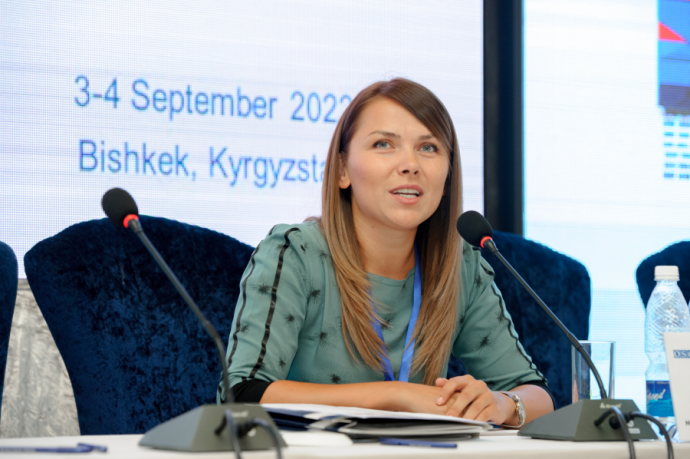Alumni Spotlight
Success Story: Ivana Vuchkova, Economic Governance and Development '2016
Peace and security, sustainable economic growth and development and good governance are essential to the progress and prosperity of all countries, including the wide OSCE region. As sine qua non of human rights and justice for all, they are reflected in the internationally and multidisciplinary design of the programmes offered by the OSCE Academy: MA in Politics and Security and MA in Economic Governance and Development. Facilitated by a team of international and local professionals, these programmes offer quality education opportunity to young professionals from Central Asia and other OSCE Participating States that makes it a unique OSCE educational project in the region and beyond. Celebrating the 20 Year Anniversary this year is only one milestone, alongside the numerous inspirational success stories and missions carried out by its students, both through their work in research and policy development, and the OSCE Academy’s projects. Being one of them it is both a privilege and a responsibility to promote the values, goals and principles of my Alma Mater, the place where learning is not only a process of solving problems, but also a process that leads to change. The quality of the interdisciplinary courses is not only guaranteed by the great professors and available learning infrastructure, but also thanks to the different perspectives brought by the dynamic of the classes themselves. In addition to the joint research tasks that we delivered day to day, the continuous exchange of our first-hand experiences from different parts of the world gave us a strong understanding that peace and sustainable development mean a different thing to a different country. Me worrying about the EU integration of my country, North Macedonia, at a time when my UK classmate was grieving about their withdrawal, was nothing close to the challenges of Afghanistan. With that environment, the Academy made us all able to look beyond our own challenges, and beyond today, in order to be equally committed towards sustainable and lasting peace and security in the wide OSCE region, regardless of where we come from.
However, peace and security in the OSCE region have been shaken at their very core with the ‘special military operation’ of the Russian Federation against Ukraine that started on February 24th this year. In addition to the already existing distrust and lack of commitment by Participating States to uphold the Helsinki and Paris principles, the ongoing stand-off has brought many questions about the future of the OSCE. Think tankers and research institutes are already inspecting potential scenarios for “saving the organization” that is undergoing a serious existential crisis while fostering a discussion about its future. While conclusions and recommendations highlight the strategic sense of keeping the OSCE alive, some side discussions may open grounds for doubts in its work and activities, especially in regions with vaguer presence of the Organization. Hence, it is high time to promote all valuable activities of the OSCE and its field missions through their direct and indirect impact on peace, security, and development. The long list of success stories of students that started twenty years ago at the OSCE Academy in Bishkek make only a small, and yet, very important part of them. Because, as much as we know quality education as a right, it is still a privilege for many, especially in less developed regions. Thanks to the OSCE Academy and thanks to the OSCE many of us have entered the world of opportunities with a joint vision: to make opportunities equally accessible to all, both through achieving sustainable development and ensuring peace and security. And that is more than a reason for keeping the Organization alive!
Our vision was also present in Perspectives 20-30, a programme that the OSCE launched 3 years ago, and where many of us as alumni took part, including myself. As members of the Core Group of Experts, we had a task to identify the primary challenges in the OSCE wide region, and demand action through the Organization’s work. Alongside the conventional approaches to both emerging and perennial challenges, we singled out energy and environment as a result of climate change as a rising non-conventional security threat that require immediate action. As a first step, considering the importance of the issue, we suggested decoupling the environment from the economic dimension into a new, separate format within the OSCE framework. We believed that elevating environmental issues to a higher level within the OSCE’s security agenda with the necessary institutional support and strengthening cooperation in terms of energy would enable effective prevention mechanisms and cooperation in case of crisis. Considering the ongoing energy crisis as a result of the ongoing war in Ukraine, and the devastating environmental catastrophes that the world has faced in the last few years, the importance of our demand has been confirmed. The work did not stop here, and we continued to promote the programme through high-level discussions and forums facilitated by the OSCE. The programme continued as well, now in cooperation with the OSCE Academy, as we also defined quality education as a catalyst for change, that has the unmatched power to transform, advance and unify societies and individuals. We see the OSCE Academy not only as a unique educational project of the OSCE, but as a catalyst of change in achieving sustainable development and ensuring lasting peace and security that should follow suit in many other OSCE regions.
Our message is one: keep the OSCE alive! Cheers to 20 years OSCE Academy and to many more years to come!



 Русская версия
Русская версия